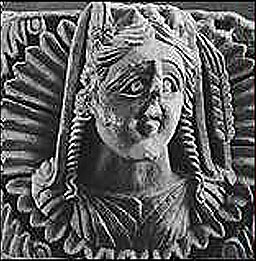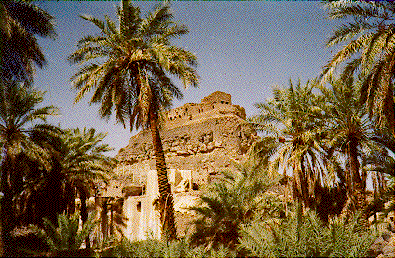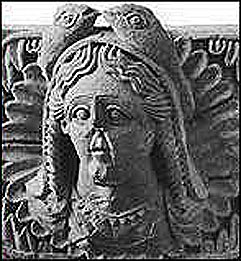
April 27th, 1998
 |
Issue# 1999.00 April 27th, 1998 |
 |
 |
 |
Aditi Chaturvedi Musalmans roamed the deserts of Arabia, centuries before the Prophet Muhammad descended from his heavens and decided to steal the term. A Musalman was none other than the Vedic term for a Man (Sanskrit Manas) who lived in the land of missiles (Sanskrit Musal). The Land of Arabia was called Musal because according to ancient Vedic texts, this was the area where most of the missiles used during the Mahabharata War are supposed to have exploded, resulting in the death of all vegetation and the emergence of the deserts of Arabia. However the year was 622 AD and Muhammad had already started his tirade against the very Vedic Culture which was responsible for his and his family's sustenance, in the form of payment by the Pilgrims that thronged to the Kaaba. However as I had described in my last article, the Prophet's concerted efforts to severe the Arabs' ties with their ancient heritage, had resulted in an unmitigated Fiasco. This left him fuming, ranting and spewing the bitterest sort of vitriol against the Vedic Gods. It had gotten to the point that the Meccans could no longer suffer this man's diatribes. The time for diplomacy was over. The Meccans had exhausted every tolerant and diplomatic method of requesting Muhammad to stop insulting and denigrating the religion that was so beloved to them and their ancestors. The proud Meccans had decided that it was now time to make it abundantly clear to Muhammad that not only were they vehemently opposed to giving up their Vedic heritage, but also that they could defend their beloved deities such as Al-Uzza, Al-Lat, etc.(different names for Durga) with force if it was necessary.  Figure 1. Al-Uzza as the Grain Goddess Thus it was on the night of 15th June, 622 AD, that an embittered and vengeful Prophet of Islam fled for his life from Mecca in the dead of night. The Prophet could not conjure up any angels or miracle to freeze the Meccan's swords, instead it was a terrified and panicky man who slipped out in the safe blackness of night to escape from the people who had had enough of his intolerance and disrespect for the religion of their ancestors. On the way he was joined by small bands of highwaymen and nomads who belonged to his group of followers. They numbered 76 and of these, only 3 were women because the women of Mecca had blatantly rejected the religion preached by the Prophet for the simple reason that they enjoyed complete independence and equality within their own Vedic religion and society. Soon after Muhammad reached Medina, his repressed vengeance and bitterness against the Hindus started manifesting itself. He purchased a garden in which there were graves of people who had followed Vedic culture, some dilapidated old shrines, and date trees. The Prophet had all the graves dug out and desecrated, all the shrines destroyed and the Palm trees cut down. This site was none other than a sacred grove and some isolated temple that had been left untended. This is how Muhammad showed utter contempt and disrespect for the souls of dead people. He had a mosque constructed on that very site. Through the ages, Muhammad's followers would preserve this tradition of desecration of non-muslim graves and emulate his example devoutly by consistently building mosques on graveyards or on top of destroyed places of worship. This first act of desecration was followed by innumerable raiding expeditions and the successive history of loot, plunder, rape and destruction that Muhammad went on to create in Medinah. One of the first such encounters was the ambush of Nakhla. A Quraish caravan carrying nothing but dried raisins and skins was making its way from the town of Taif to Mecca. The little convoy was escorted by only four men. They had set out to do business during one of the four sacred months. Rejeb was one of the months which was considered auspicious for trade in Arabia. Any form of warfare or violence was strictly abhorred. The Arabs being men of honor, never violated this rule, and thus the sacred months were the time when most people set out on their caravans to trade. The Muslims mercilessly murdered the hapless UNARMED merchants and plundered all their goods as booty, of which Muhammad got one fifths. Many more such raids would follow to satisfy the Prophet's bloodlust. He fed his bitterness and vengefulness with the sight of his murdered victims. After the Battle of Badr, the Prophet sent his servant to search the field for one of his strongest opponents, Abu Jahal. When the servant found Abu Jahal's corpse, he cut off the head and threw it down at the feet of Muhammad, who cried out in ecstasy:
The Prophet then ordered a great pit to be dug and had the bodies of the "unbelievers" dumped into it after the Muslims had unceremoniously hacked them into pieces. As the bodies were thrown into the pit, an excited Muhammad screamed"
One of the prisoners taken was the defiant Al Nadr Ibn al Harith, who had earlier taken Muhammad's challenge of telling better stories than him. Muhammad ordered Ali to strike off Nadr's head in his presence, so he could watch the beheading of the man who had insulted him. Another prisoner Uqba ibn Abi Muait was decapitated in front of the Prophet, upon seeing him, the prisoner cried out:
"Hellfire", replied Muhammad coldly as the blade came down and spattered his clothes with Uqba's blood. Upon his return to Medina, a number of the Vedic poets of Medina composed poems that talked of the Prophet's cruelty. It was the poets who acted as the conscience of society at that time and had the most freedom of expression. Muhammad was infuriated at the criticism. The most popular poet was Asma Bint Merwan, a married woman with five children. One night as she lay in her bedroom suckling her newborn child, a group of Muslims broke into the house to plunge their swords into the breast of the woman. The newborn infant was hacked to pieces. Soon afterwards an elderly poet, Abu Afek, who was respected for his distinguished sense of fairness, met the same fate. Living with a Jewish tribe called Beni Al Nadheer, was an Arab by the name of Kaab Ibn Ashraf of the Tribe of Tai. Kaab is obviously the Sanskrit word Kayva which means poetry . Kaab was true to his Vedic name, a renowned poet who had composed a lament for the Leaders of Quraysh who had been massacred in the battle of Badr. One day the Prophet proclaimed:
A certain Muhammad Bin Maslama replied that he would do it, adding "we shall have to tell lies to do it". The Prophet immediately gave him the divine authority to lie as necessary. Muhammad Maslama bribed the foster brother of Kaab, a man called Silkan who had openly become Muslim. The following night Kaab was visited by his loving foster brother and spent a pleasant evening reciting poetry. Needless to say, after dark, Kaab was dragged out of his bed screaming, and stabbed repeatedly by Muhammad Maslama, Silkan and two other devout Muslims, in full view of his family. Such was the example of tolerance set by the Prophet of God. On another occasion , the tribe of Beni Quraidha was besieged and when they refused to convert to Islam, the Prophet meted out another merciful sentence.A huge trench was dug around the main market of Medina. The men were rounded up & their hands tied behind them. Then one by one, they were led to the trench and forced to kneel. They were offered one last chance to convert to Islam & upon their refusal, had their heads chopped off. As soon as one head would roll off, the headless body would be dumped into the ditch, until the pile of bodies, heads and blood had filled up to the brim. Yet, none of the Jews chose to compromise their religion. Eight Hundred innocent Jews were beheaded bloodily in this manner, for the simple reason that they chose to retain their fundamental human right, to choose their God. Helpless women & children screamed as they watched their fathers, husbands & sons die. Later they too were tied up & bundled off as slaves. The Prophet forced the Jewess Raihana Bint Amr to convert and marry him, hours after he had murdered her father, brothers and clansmen before her very eyes. To this day Muslim scholars claim, that Raihana willingly chose Islam and wifehood with the Prophet.  Figure 2. Khayber - The Jewish Settlement which was besieged by Muhammad and his followers The Battle of Badr had given Muhammad the wealth to bribe more people into accepting Islam. In addition the increase in power enabled the Muslims to rule by terror. Even the same Jews who had helped the Muslims in their moments of deepest crisis with food as well as military assistance, were subjected to conversion by the sword or not spared. Muhammad's reign of terror continued with the Battle of Uhud, Khayber and numerous other expeditions which helped the Muslims to gain Booty and slaves. Most of these slaves were women and children, These were victimised and raped. Khayber was a settlement of neutral Jews who were known for their business acumen. Muhammad simply had to satisfy his greed, by attacking this peaceful settlement. Although the Jews fought bravely, they could not stop the Mob of Muslims, who were in a bloodthirsty frenzy of Greed. The Prophet forced another Jewess Safia Bint Huyay to convert and marry him, in exactly the same manner as Rehaina Bint Amr. She had to watch her Husband, father and brother hacked to pieces before her eyes. Immediately after the battle, the Prophet's eye fell on this woman of intense beauty, and he threw his cloak on her to claim her as his booty. Indeed the Prophet had committed himself to saving widows in need by marrying them! The remaining women and children who were'nt attractive enough to keep as personal slaves, were rounded up to be traded in the slave market or retained to be brought up as brainwashed servants of Islam.  Figure 3. Al-Uzza as the Fish Goddess By now Muhammad had gathered enough followers to vent his final and most massive burst of vengeance : The capture of Mecca. The city of Vedic culture that had rejected him so contemptuously, and contained the Kaaba temple of Al-Lat, Al-Uzza, and Al-Manat beckoned him with its immense wealth and splendour. Al-Lat, Al-Uzza and Al-Manat and all the other Vedic deities of the Hindu pantheon, were the Prophet's deadliest enemies. It was their presence that invalidated all his claims and threatened his monopoly; therefore all visible signs of it had to be obliterated at any cost. His passionate hatred against any sign of Vedic culture was so intense, that he condemned the wearing of any garment that had even come in contact with Saffron or Turmeric, because these are the two spices that are used most often in Hindu rites of worship. One day, a man, wearing a vest dyed with some yellow colour, approached the Prophet to ask him about 'umra rites. Sure enough, an immediate revelation came down and the Prophet had to be covered in an overgarment (they used to do this to restrain the violence of his epileptic fits). Raising a corner of the garment, Umar saw the Prophet's face had gone red and he was snuffling like a young camel. "Wash off all traces of the yellow and put off the vest", the Prophet screamed! The Prophet's mission now was to strike at the very roots, that had sustained him, the roots of Vedic culture in Arabia. His hatred for the religion of his forefathers had multiplied a hundredfold, because it was the Arabs' love for those very deities and spiritual traditions that stood in the way of Muhammad's vision : the vision of absolute subjugation of Arabia, and Muhammad's self-exaltation to the title of Divine Messenger As Sitaram Goel puts it :
In my next article, I will relate the details of the destruction and carnage, effected by Muhammad in the Capture of Mecca. Note: The Works "The Life & times of Muhammad" by Sir John Glubb, "An Introduction to the Hadith" by John Burton and "Hindu Temples: What Happened to Them?" by Sita Ram Goel have been used to compose this article. |
|
Previous | Index | Next Your comments |
|
© Sword of Truth, 2001 All rights reserved. Concept and Design by |